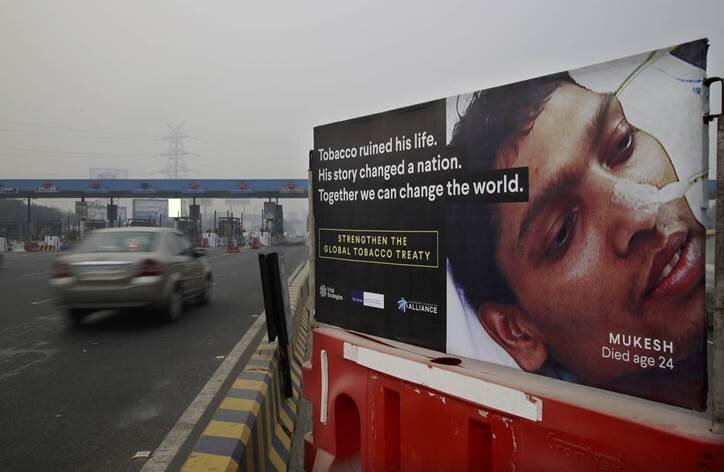- Home > News > International News
- international news
WSJ: Bloomberg Expands Effort to Curb Tobacco Use World-wide
Commits $360 million to help raise tobacco taxes and implement other tobacco control policies in the developing world

An antitobacco advertisement along a road outside New Delhi, India, in November.PHOTO: ASSOCIATED PRESs
By BETSY MCKAY
Former New York City mayor and billionaire philanthropist Michael Bloomberg has spent hundreds of millions of dollars of his fortune over the past decade fighting tobacco use in the developing world. Now, with cigarette use declining globally, he is deepening his campaign.
Mr. Bloomberg is committing $360 million to be used between 2017 and 2022 to help raise tobacco taxes, implement smoke-free laws and pursue other strategies to curb tobacco use in low- and middle-income countries, according to Bloomberg Philanthropies, the philanthropic arm of his foundation.
Curbing tobacco use is a signature cause for Mr. Bloomberg, whose administration famously instituted smoking bans, graphic ad campaigns, sharp tax increases and other measures to get people in New York City to kick the habit—with effect, as smoking rates fell significantly during his tenure.
He is going after smoking globally too. The new money brings to at least $955 million the amount he has committed since 2007 to tobacco-control efforts in low- and middle-income countries, where nearly 80% of the world’s more than 1 billion smokers reside.
“Reducing tobacco use is one of our greatest opportunities to save lives and prevent suffering, because we know that strong policies really do make a difference,” Mr. Bloomberg said.
Funds from Bloomberg Philanthropies made to governmental and nongovernmental organizations, have to date contributed to the passage or support of tobacco-control laws and policies in 59 countries, offering protection to nearly 3.5 billion people and saving an estimated 30 million lives, said Kelly Henning, who heads Bloomberg Philanthropies’ public-health programs. Those policies include smoke-free laws in 39 countries, requirements in 32 countries that cigarette packages carry large graphic warning labels and bans on tobacco advertising and sponsorship in 22 countries, Bloomberg Philanthropies said.
The new funds will be focused in particular on efforts to raise tobacco taxes, she said.
Tobacco-control experts say that Bloomberg Philanthropies’ funds have accelerated a push to curb smoking that has been in gear since the implementation of the WHO’s Framework Convention on Tobacco Control, an international treaty signed by 180 countries that entered into force in 2005.
Consumption of cigarettes has declined globally since 2012, according to data service Euromonitor International, though 5.6 trillion cigarettes were still sold in 2015, and makers of cigarettes are investing in alternative products as restrictions on smoking grow in many countries. Philip Morris International Inc.’s chief executive said last week that the tobacco company could move away from selling cigarettes altogether.
PMI didn't respond to a request for comment on Bloomberg Philanthropies’ tobacco control efforts.
“The zeitgeist has changed around smoking globally,” said Michael Eriksen, dean of Georgia State University’s School of Public Health and head of a large research effort there on tobacco use and products. “Countries are competing now over who has most of their cigarette packs covered by a warning label.”
| Chinese Association on Tobacco Control Copyright © 1992-2011 906-907 Anhuidongli, Chaoyang District Beijing 100101 |